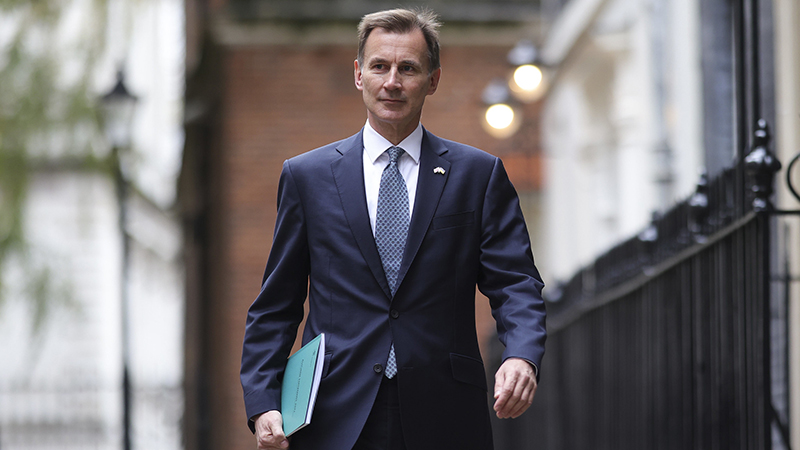Chancellor Jeremy Hunt has announced a raft of changes in taxation and public spending in today’s autumn statement, as the government sought to repair the public’s faith in its economic competence. Before the statement, Premier Miton Investors CIO Neil Birrell said everyone was looking for a greater degree of certainty, and that markets will also want to see prudent economic policy measures from government. He added: “We have seen what happens when imprudent policy is announced.”
According to Rachel Winter, a partner at Killik, the appointment of Hunt and Sunak “restored a degree of confidence”, and she observed the positive response from markets in the lead up to the chancellor taking to the despatch box. During the statement itself, Winter noted that the exchange rate between the pound and the dollar remained steady for the duration of the speech. The rate now sits at $1.18, having began begun the day at $1.19.
The FTSE 100 and FTSE 250 have also remained stable, with both down only very slightly from their opening points.
The statement was certainly a far cry from the imprudence of his short-lived predecessor, as Hunt sought to fill the fiscal black hole that Kwasi Kwarteng opened. The highest income tax threshold is set to fall from £150,000 to £125,140, while capital gains and dividend tax thresholds will halve in April next year. He also announced windfall taxes on energy companies and a freezing of NI and inheritance tax bands.
Chris Beauchamp, chief market analyst at trading platform IG Group, identified a muted reaction to what he deems as a “rather dramatic” set of changes to the tax system. However, he adds that markets seem to have been reassured by the commitment to infrastructure spending. Beauchamp claims that this is a sign of the government’s willingness to invest and help the economy through the tough period ahead.
He adds: “This is not necessarily austerity 2.0, perhaps 1.5, with less of the extreme commitment to simply cutting spending, if only perhaps there is now much less room to cut spending than in 2010.”
Though markets appear reassured, Killik’s Winter says that UK investors will be worse off after cuts to the dividend and capital gains allowances come into force. The government plans to halve the £2,000 dividend allowance from April 2023 and halve it again in April 2024 to just £500. It will also reduce the CGT annual exempt amount from £12,300 to £6,000 from April 2023, and to £3,000 at the same point the following year. “It is now more important than ever for individuals to use their annual ISA allowances to protect their investments”, says Winter.
Jeremy Croysdill, director of wealth planning at Brown Shipley, argues that the reduction in the dividend allowance and the halving of the CGT annual exemption means a double hit for investors, adding that there are “no winners” in this autumn statement.
“To put this into context, the reduction in the capital gains tax exemption means a portfolio generating at least £12,000 in capital gains will lose around £1,200 a year. An income portfolio generating at least £2,000 dividends will lose over £300 a year for a higher rate taxpayer given the reduction in the dividend allowance.”
On the reduction in the additional rate of income tax threshold, he notes: “Individuals with income of between £125k and £150k will now also likely lose their £500 personal savings allowance in addition to paying the additional 5% income tax.”
Les Cameron, head of technical at M&G Wealth, also flags up the detrimental impact on investors, saying: “For those with investment income and gains speaking to a financial planner should allow them to make arrangements to lessen the impact on their finances.”
Entrepreneurs and diligent long-term investors are being penalised by the changes, according to Susannah Streeter, senior investment and markets analyst at Hargreaves Lansdown. Though she notes that lower income earners are hit hardest by the current cost of living crisis, and that taking a greater slice of investor profits is being viewed as a fairer way of evening up the playing field, it may in fact lead to investors hoarding their funds.
In all, the economy looks to be in better hands, but Vivek Paul, UK chief investment strategist, Blackrock Investment Institute, reminds us that the UK is poised for a longer recession than the US or euro area.
Though this chancellor appears more responsible than the last, the broader economic situation remains the same, with inflation at its highest point in 41 years and a difficult winter approaching for households across the UK.
At the conclusion of his speech, Hunt said: “We aren’t immune to these headwinds but with this plan for stability, growth and public services, we will face into the storm.”










